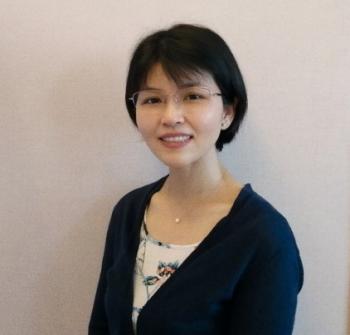WU Peixia

1) ENT Nursing and Clinical Research;
2) Vestibular/Vertigo Rehabilitation;
3) Evidence-based Nursing Practice
BIOGRAPHY
Dr. Peixia Wu is committed to the rehabilitation treatment and clinical research of dizziness and balance disorders. Her team is the first to set up a vertigo rehabilitation clinic and has successfully developed the first dynamic balance function test and rehabilitation system in China. She also has extensive research and practice in the field of evidence-based nursing and nursing management.
Her team had established the Vertigo and Vestibular Dysfunction Clinical Center, which focuses on the diagnosis, treatment and rehabilitation of refractory Meniere's disease, benign paroxysmal positional vertigo, vestibular neuritis, bilateral vestibular disease, senile vestibular disease, psychological vertigo, and various kinds of vertigo of unknown causes. So far, they have provided treatment and rehabilitation for more than 2000 patients, and have made important contributions in exploring the innovative strategies for management for complicated cases, as well as in designing vestibular function testing and rehabilitation equipment.
EDUCATION & TRAINING
Sep 2016 – Dec 2019
PhD study: School of Nursing, Fudan UniversitySep 2008 – Jun 2011
hD study: School of Nursing, Fudan University
TEACHING & RESEARCH
Teaching Areas:
Nursing for ENT Disorders, Evidence-based Nursing, Nursing Research
Research Grants:
Fudan University 'double first class' key research projects: Biomechanical mechanisms and intervention strategies of automatic postural control in patients with Meniere's disease (2021.3-2021.12), PI
Shanghai Science and Technology Commission Project, Development of dynamic balance function testing and rehabilitation system (2020.10-2023.9),PI
Shanghai Municipal Health Commission, Clinical Research project: A randomized controlled study on the effects of vestibular rehabilitation in patients with otogenic vertigo (2020.1-2021.12) ,PI
Pilot project of clinical research of Shanghai Medical College of Fudan University in 2020: Diagnosis and treatment strategy of refractory Meniere's disease. (2020.9-2022.8), PI
ACADEMIC SERVICE
Deputy Director of the Shanghai Base of the Dizziness Specialized Committee of the Chinese Medical Education Association.
Youth Member of the Dizziness Specialized Committee of the Chinese Medical Education Association.
Member of the Expert Database of the Otolaryngology Committee of the Chinese Nursing Association.
Member of the Expert Database of the Science Popularization Professional Review Committee of the Shanghai Nursing Association.
SELECTED PUBLICATIONS
Peixia Wu, Liu X, Dai Q, et al. Diagnosing the benign paroxysmal positional vertigo via 1D and deep-learning composite model[J]. Journal of Neurology, 2023: 1-10.
Peixia Wu, Wan Y, Zhuang Y, Wang C, Xi S, Zhu H. WeChat-based vestibular rehabilitation for patients with chronic vestibular syndrome: protocol for a randomised controlled trial. BMJ Open. 2021, 2;11(3): e042637. doi: 10.1136/bmjopen-2020-042637.
Peixia Wu, Jun Yang, Xinsheng Huang, Zhaoxin Ma, Tianzheng Zhang, Huawei Li. Predictors of residual dizziness after successful repositioning in benign paroxysmal positional vertigo: A multi-center prospective cohort study, Journal of vestibular research, 2020, 31(2):1-11.
Peixia Wu, Wenzhu Cao, Yan Hu, Huawei Li. The effects of vestibular rehabilitation, with or without betahistine, on managing residual dizziness after successful repositioning maneuvers in patients with benign paroxysmal positional vertigo:a protocol for a randomized controlled trial ,BMJ open,2019;9(6): e026711. Doi: 10.1136/bmjopen-2018-026711.
Peixia Wu,Mei Yang, Yan Hu, Huawei Li. Cross-cultural adaptation and validation of the Chinese version of the vestibular activities and participation measure, Journal of vestibular research, 2019,29(4):171-179.
Peixia Wu, Peng Z, Chen J, Yan Hu. Uncertain effect of preventative shoulder rehabilitation for patients who underwent total laryngectomy with neck dissection[J]. European Archives of Oto-Rhino-Laryngology, 2018, 275(2):1-7.
Fangzhou Yu, Peixia Wu#(co-first author); Haowen Deng , Jingfang Wu; Shan Sun,Huiqian Yu; Jianming Yang, Xianyang Luo; Jing He, Xiulan Ma, Junxiong Wen, Danhong Qiu , Guohui Nie,Rizhao Liu; Guohua Hu, Tao Chen, Cheng Zhang , Huawei Li. A Questionnaire-Based Ensemble Learning Model to Predict the Diagnosis of Vertigo, Journal of Medical Internet Research, 2022, 24(7): e34126.
Yu J, Wan Y, Zhao J, Huang R, Peixia Wu*(co-coressponing author), Li W. Normative data for rotational chair considering motion susceptibility. Frontier Neurology, 2022 Aug 22;13:978442. doi: 10.3389/fneur.2022.978442.
Wu Peixia, Liu Jianping, Wang Wuqing, Li Huawei. Intervention strategies for residual symptoms after repositioning in patients with benign paroxysmal positional vertigo: a single-center randomized controlled trial. Chinese Journal of Otorhinolaryngology Head and Neck Surgery, 2021, 56(1): 41-46. In Chinese.
Wu Peixia, Yang Jun, Huang Xinsheng, Ma Zhaoxin, Li Huawei. The impact of dynamic balance function during the onset of benign paroxysmal positional vertigo on residual symptoms after repositioning: a multicenter prospective cohort study. Chinese Journal of Otorhinolaryngology Head and Neck Surgery, 2021, 56(5): 1277-1281.In Chinese.


